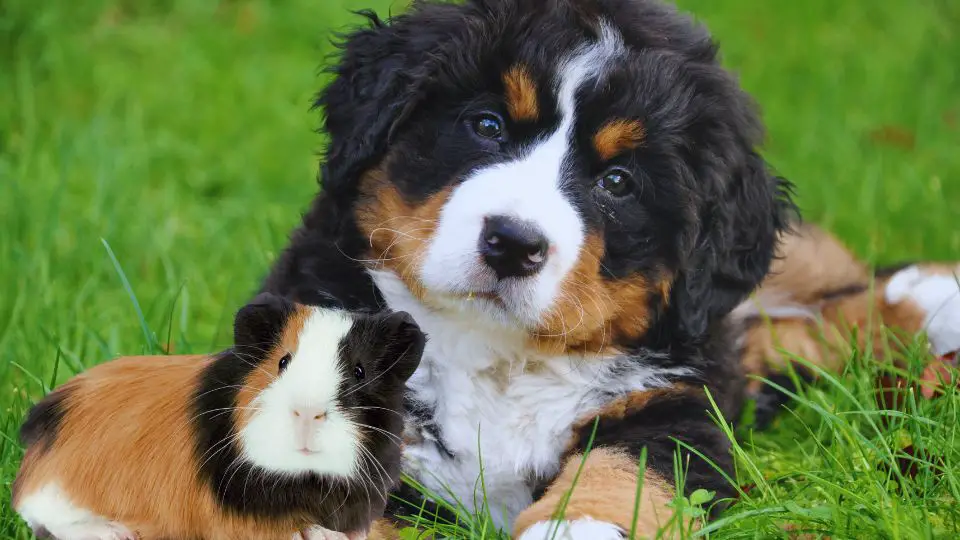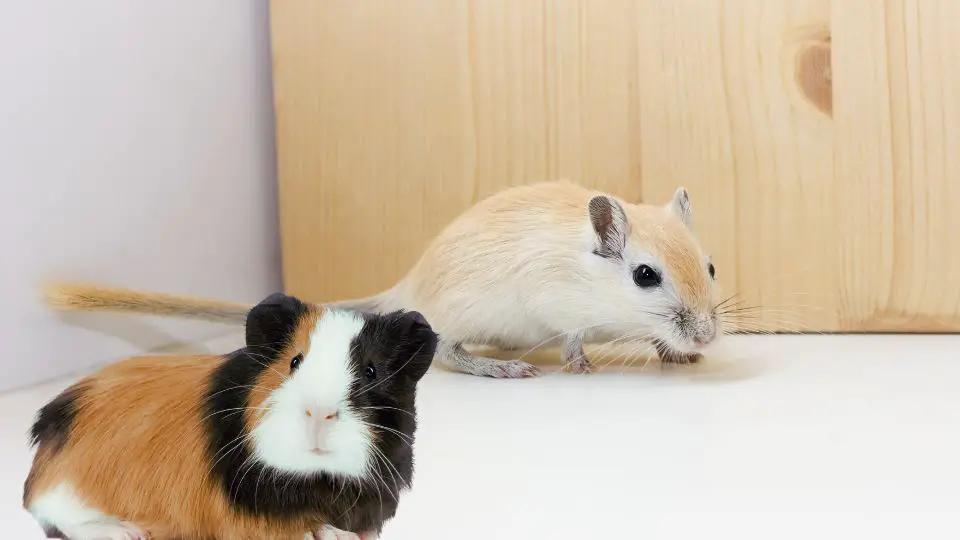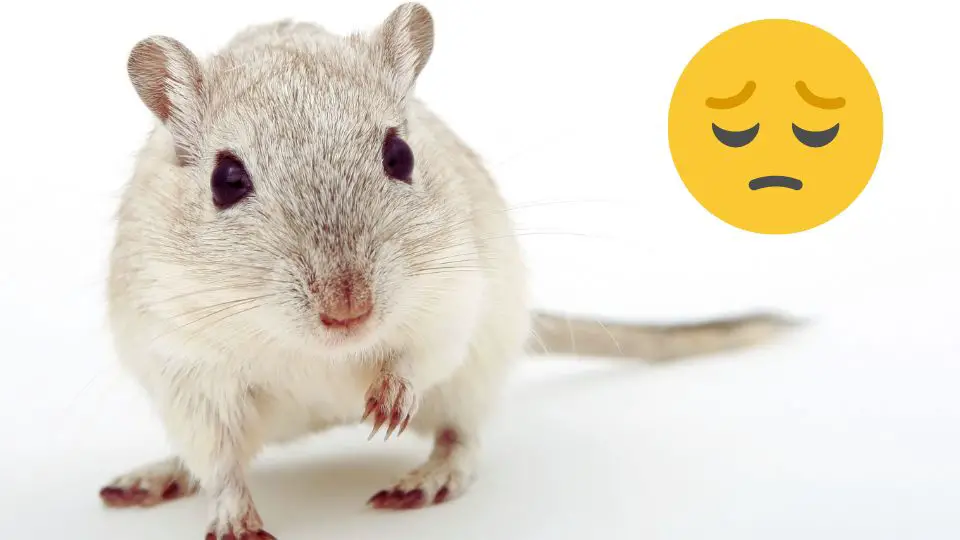Have you noticed your gerbil making persistent attempts to escape from its cage? Gerbils are naturally curious and adventurous creatures, and their escape attempts can be a sign of underlying needs or issues.
So, your gerbil may be trying to escape for several reasons, including a desire for exploration, a need for more space, or a lack of mental and physical stimulation.
In this article, we will explore the various reasons why gerbils may try to escape and provide insights on how to address this behavior.
Natural Instincts and Curiosity
Gerbils are native to arid regions such as deserts, where they have adapted to a life of burrowing and exploring their surroundings. In the wild, gerbils create complex tunnel systems to provide shelter, protect themselves from predators, and find food. This burrowing behavior is deeply ingrained in their DNA and is a reflection of their natural instincts.
When kept in captivity, gerbils retain these instincts and often display a strong desire to explore their environment. They have a natural inclination to dig, tunnel, and investigate their surroundings. This instinct for exploration and burrowing can sometimes manifest as escape attempts, as gerbils try to find new territories to satisfy their natural instincts.
Curiosity as a Driving Factor for Escape Attempts
Curiosity is another key aspect of a gerbil’s behavior that can contribute to their escape attempts. Gerbils are curious animals that enjoy exploring new places and investigating unfamiliar objects. Their inquisitive nature drives them to seek out new stimuli and experiences.
When confined to their enclosure for extended periods without adequate mental and physical stimulation, gerbils may become restless and seek opportunities for exploration. Their curiosity can push them to find ways to venture beyond their usual habitat, leading to escape attempts.
Note that gerbils’ escape attempts are not driven by a desire to flee from your care. Instead, these attempts arise from their innate instincts and natural curiosity, which should be acknowledged and respected.
Environmental Factors
In our experience, environmental factors are one of the most common causes of gerbils trying to escape. Here are some common reasons that we know about:
Inadequate or Cramped Living Space
Gerbils are active and curious animals that require sufficient space to explore, run, and play. When gerbils feel confined in a small or cramped enclosure, they may become stressed and seek opportunities to escape in search of more space.
It is essential to provide a habitat that allows gerbils to exhibit their natural behaviors, including burrowing, climbing, and running. A spacious enclosure with multiple levels, platforms, and tunnels can provide the necessary space for gerbils to thrive and minimize their inclination to escape.
Lack of Mental and Physical Stimulation
Gerbils are intelligent creatures that require mental and physical stimulation to prevent boredom and ensure their well-being. Inadequate mental and physical stimulation can lead to restlessness and increased escape attempts.
It is crucial to provide a variety of stimulating activities, such as toys, tunnels, and objects to chew on, to keep gerbils engaged and entertained. Regular playtime and interaction with their owners also contribute to their overall stimulation and help prevent boredom.
Boredom and Need for Enrichment
Boredom is a significant factor that can drive gerbils to try to escape their enclosures. Gerbils have a natural need for enrichment to satisfy their curiosity and prevent boredom. Providing a stimulating environment can help fulfill this need and reduce their desire to escape.
Enrichment activities can include hiding treats for them to discover, introducing new toys or objects to explore, or providing opportunities for natural behaviors like digging or foraging. By offering a variety of enriching experiences, gerbil owners can keep their pets mentally stimulated and minimize escape attempts.
Stress and Discomfort
Gerbils are naturally skittish and can be easily stressed by loud noises, sudden movements, or frequent disturbances. A high-stress environment, such as a noisy household or a cage placed in a busy area, can contribute to gerbils’ desire to escape.
It is important to provide a calm and quiet environment for gerbils to help minimize their stress levels. Placing their cage in a peaceful area away from high-traffic areas or noisy appliances can help create a more tranquil setting for gerbils to feel secure.
Uncomfortable or Unsuitable Cage Conditions
Gerbils rely on their cages as their primary living space, and the conditions within the cage greatly impact their comfort and well-being. If the cage is too small, lacks proper ventilation, or has an uncomfortable flooring material, gerbils may become restless and attempt to escape.
It is essential to provide a spacious and well-ventilated cage that allows gerbils to move around comfortably. The flooring material should be soft and safe for their feet, such as aspen shavings or paper-based bedding.
Additionally, gerbils require appropriate hiding spots, platforms, and toys to engage in natural behaviors and feel secure in their cage. Lack of these essential cage furnishings can contribute to their discomfort and desire to escape.
Ensuring that the cage is equipped with suitable accessories and providing opportunities for mental and physical stimulation can help alleviate their stress and reduce escape attempts.
Hormonal Factors
When gerbils reach sexual maturity, typically around three to four months of age, they may experience a surge in hormones and exhibit mating instincts. This can result in increased restlessness and a desire to find a mate. Gerbils may attempt to escape their enclosures in search of potential mates or to explore their surroundings for potential breeding opportunities.
To address this hormonal factor, you should ensure that your small pets are provided with appropriate socialization and companionship. Keeping gerbils in pairs or groups can help fulfill their social and reproductive needs, reducing the drive to escape in search of a mate. However, it is crucial to ensure that gerbils are compatible and properly introduced to avoid conflicts or aggression.
Loneliness and Lack of Social Interaction
When gerbils feel lonely, they may attempt to escape from their enclosures in search of companionship. They may exhibit increased restlessness, pacing, or attempts to chew or dig through the cage bars. Gerbils are resourceful creatures and may actively seek out other gerbils or even try to interact with their human caregivers as a way to alleviate their loneliness.
To address the issue of loneliness and prevent escape attempts, it is crucial to provide gerbils with suitable companionship. Keeping gerbils in pairs or small groups is highly recommended, as it allows them to engage in natural social behaviors and fulfill their need for companionship. When introducing gerbils, follow proper introduction protocols and monitor their interactions to ensure compatibility.
If you can’t keep multiple gerbils, providing them regular social interaction with you is essential. Spend quality time with your gerbil, offering gentle handling, play sessions, and enrichment activities to keep them mentally stimulated and emotionally fulfilled. Building a bond of trust and providing positive interactions can help alleviate their loneliness and reduce the desire to escape.
Identifying Signs of Escape Attempts
When you observe signs of escape attempts in your gerbil, it is important to take appropriate measures to address the situation and ensure their safety. Start by evaluating the cage for any potential escape routes or weak spots. Reinforce the cage structure, ensuring that all openings are securely closed and there are no gaps that your gerbil can exploit. It may be necessary to upgrade to a more escape-proof enclosure if your gerbil consistently manages to find ways to escape.
Here are the most common signs that your gerbil tries to escape:
Scratching or Chewing on Cage Bars
One of the most noticeable signs of an escape attempt is when a gerbil repeatedly scratches or chews on the cage bars. Gerbils have sharp teeth and strong claws, and their instinctual behavior may drive them to test the strength and durability of the bars. If you notice excessive scratching or chewing on the cage bars, it may be a clear indication that your gerbil is attempting to find a way out.
Persistent Attempts to Squeeze through Small Openings
Gerbils are agile and flexible creatures, capable of squeezing through small openings. If you observe your gerbil persistently trying to squeeze through small gaps or openings in the cage, it is a strong indication that they are attempting to escape. They may push their body against the opening or use their paws to widen the gap. This behavior can be dangerous, as gerbils may injure themselves or become trapped in the process.
Climbing or Jumping Behaviors
Gerbils are skilled climbers and jumpers, and they may display these behaviors as part of their escape attempts. If you notice your gerbil constantly climbing or jumping against the cage walls, it may be a sign that they are seeking higher ground or attempting to reach areas where they believe they can escape. Climbing and jumping can be particularly concerning if your gerbil demonstrates a persistent and determined effort to reach the top of the cage.
Conclusion
In conclusion, if you find your gerbil trying to escape from its cage, it’s important to investigate the underlying reasons and take appropriate measures to address them. By providing a suitable and spacious living environment, ensuring mental and physical stimulation, and fulfilling their social needs, you can help minimize escape attempts and promote a happier and more content gerbil.
Remember, each gerbil is unique, so observe their behavior closely and make adjustments accordingly. With patience, understanding, and proper care, you can create a safe and enriching environment for your gerbil, ensuring their well-being and minimizing their desire to escape.







